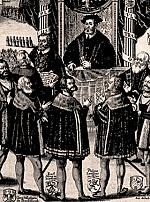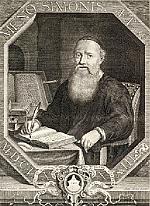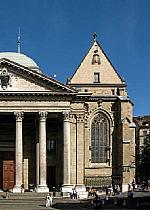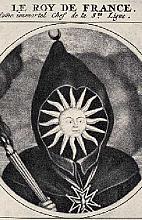Christian History Timeline: The Gospel According to Bach
The Renaissance
1450
1455 Gutenberg completes first Bible using movable type
1483 Martin Luther is born
1509 John Calvin is born
1517 Luther posts his 95 Theses on indulgences in Wittenberg
1521 Luther is excommunicated by the pope; at Diet of Worms, he refuses to recant writings; he begins translating the New Testament into German while hiding in Wartburg Castle
1523 Luther publishes Latin Mass for the church in Wittenberg
1526 Luther publishes German Mass for use in small congregations; Johann Walter becomes “the first Lutheran cantor” in Torgau
c. 1527 Luther writes hymn “A Mighty Fortress”
1529 Luther publishes Large Catechism and Small Catechism
1534 Luther publishes German Bible
1534 Break between Church of England and Roman Catholic Church
1536 Calvin publishes Institutes of the Christian Religion
1538 Walter writes “In Praise of the Noble Art of Music”
1539 Luther preaches at St. Thomas’s Church in Leipzig
1543 Copernicus argues that earth revolves around sun
1546 Luther dies
1555 Peace of Augsburg gives Catholic and Lutheran rulers in Germany the right to choose their territories' religion
1585 Johann Heermann, writer of the hymn “Ah, Holy Jesus,” is born
1595 Michael Praetorius becomes organist at Wolfenbüttel
c. 1597 The first opera Daphne is performed in Florence, Italy
The Baroque Period
1600
1600 Shakespeare writes Hamlet
1603 Queen Elizabeth I of England dies
1607 Paul Gerhardt, writer of the hymn “O Sacred Head,” is born
1611 King James Bible is published
1618 Beginning of the Thirty Years’ War in Europe
1636 Heinrich Schütz writes German Requiem
1642 English Civil War begins
1647 Westminster Confession becomes the standard of Presbyterian faith in Scotland
1648 Peace of Westphalia ends Thirty Years’ War
1667 Milton publishes Paradise Lost
1668 Dietrich Buxtehude becomes organist at St. Mary’s Church in Lübeck, Germany
1669 Rembrandt dies
1675 Philipp Spener's Pia desideria launches German Pietist movement, emphasizing personal devotion and simple worship
1680 Antonio Stradivari begins making violins
c. 1680 Johann Pachelbel writes Canon in D Major
1685 Johann Sebastian Bach is born in Eisenach, Germany
1685 George Frideric Handel is born in Halle
1687 Newton publishes theories on motion and gravity
1695 Bach’s father dies; Bach goes to live with brother Johann Cristoph in Ohrdruf
1700
1700-1702 Bach is a choirboy in Lüneberg
1703 Bach becomes lackey and musician at the court of Duke Johann Ernst of Saxe-Weimar
1703-1707 Bach serves as organist of the New Church in Arnstadt
1705 Bach visits Buxtehude in Lübeck
1707-1708 Bach serves as organist at St. Blasius Church in Mühlhausen
1707 Bach marries his cousin Maria Barbara
1707 Publication of Hymns and Spiritual Songs by English hymn writer Isaac Watts; Methodist hymn writer Charles Wesley is born
1708 First performance of Gott ist mein König, the only one of Bach’s cantatas to be published in his lifetime
1708-17 Bach serves in the court of Dukes Wilhelm Ernst and Ernst August of Saxe-Weimar
1717-23 Bach serves in the court of Prince Leopold of Anhalt-Cöthen
1720 Maria Barbara dies
1721 Bach dedicates six concertos to Margrave Christian Ludwig of Brandenburg; he marries Anna Magdalena Wilcke
1722 Bach completes first part of The Well-tempered Clavier
1723-1750 Bach serves as cantor of St. Thomas Church in Leipzig
1723 First performance of Bach’s Magnificat
1724 First performance of Bach’s St. John Passion
1727 First performance of Bach’s St. Matthew Passion
1730 Bach writes a “Short But Most Necessary Draft for a Well-Appointed Church Music” to the Leipzig town council
1731 Bach publishes first part of Clavier-Übung (Keyboard Practice)
1732 Bach composes Coffee Cantata for Collegium Musicum performance at Zimmerman’s Coffee House
1734-35 First performance of Bach’s Christmas Oratorio
1736 Bach is appointed Royal-Polish and Electoral-Saxon Court Composer
1741 Publication of Goldberg Variations
1742 Handel's Messiah is first performed in Dublin, Ireland
1747 Bach visits the court of Frederick the Great
1748-49 Bach completes B Minor Mass
1750 Bach dies
The Classical Period
1750 (–c. 1820)
1756 Mozart is born
1759 Handel dies
1759 Voltaire publishes Candide
1770 Beethoven is born
1776 American Declaration of Independence
1789 French Revolution begins
By Paul Westermeyer and the editors
[Christian History originally published this article in Christian History Issue #95 in 2007]
Next articles
From Luther to the Lutherans
How a dynamic reform movement became a territorial church
David M. WhitfordFrom turmoil to peace
How Menno Simons and Pilgram Marpeck guided Anabaptists through troubled times
Mary S. SprungerAnother accidental revolutionary
The rise of the Reformed tradition in France—and its most famous son
Jon BalserakCalvin, Councils, Confessions, Did you know?
Calvin the teacher, Menno the preacher, Elizabeth the queen, and those unpronounceable French Protestants
the editors






